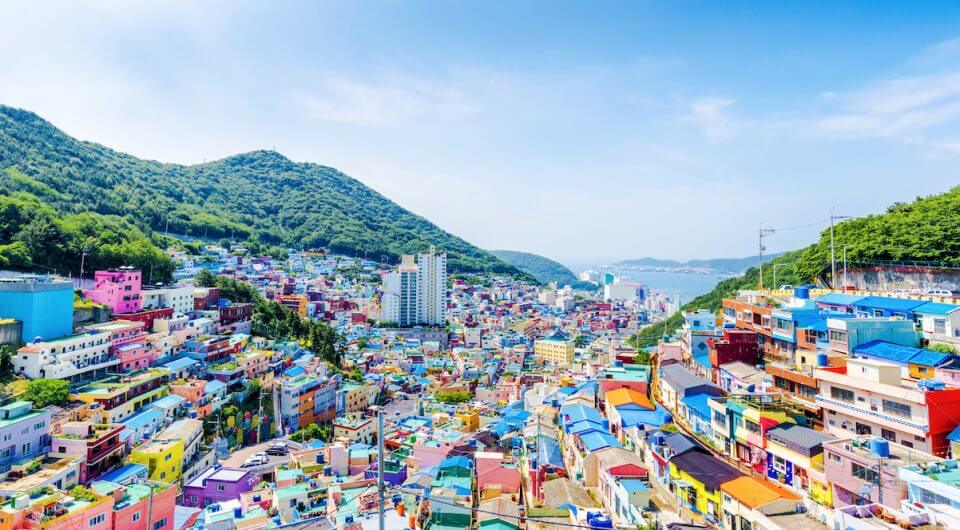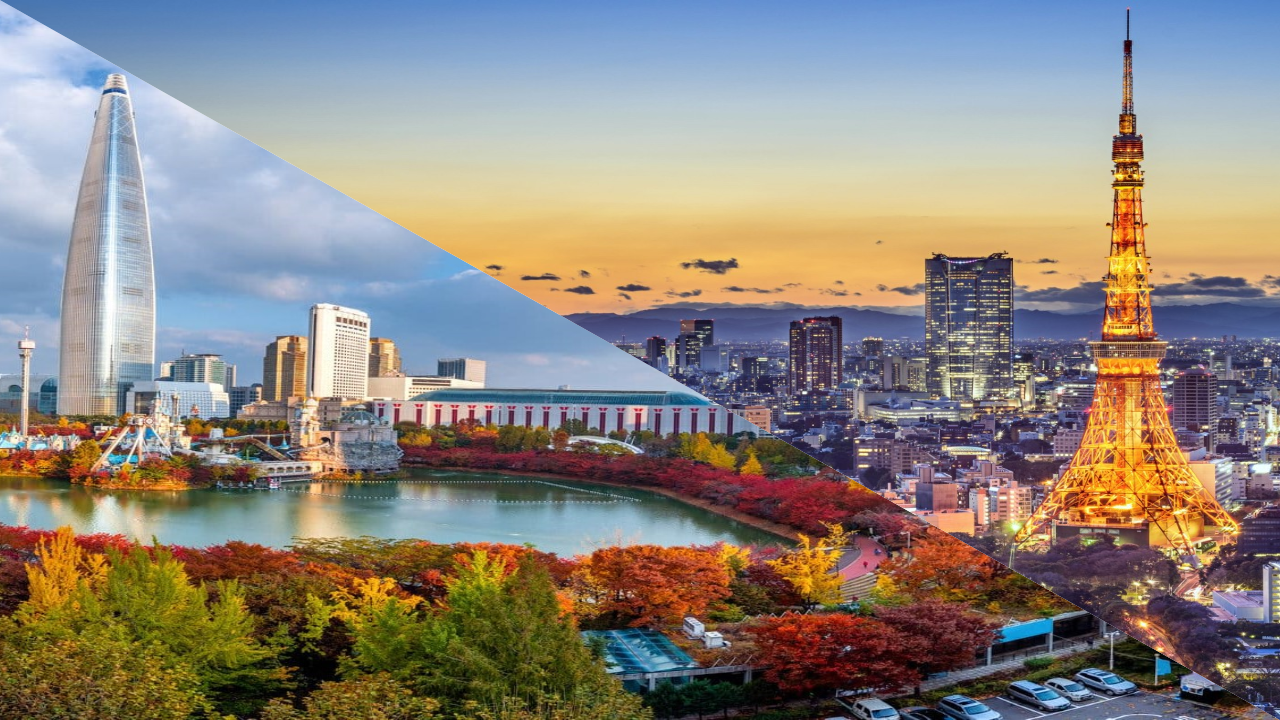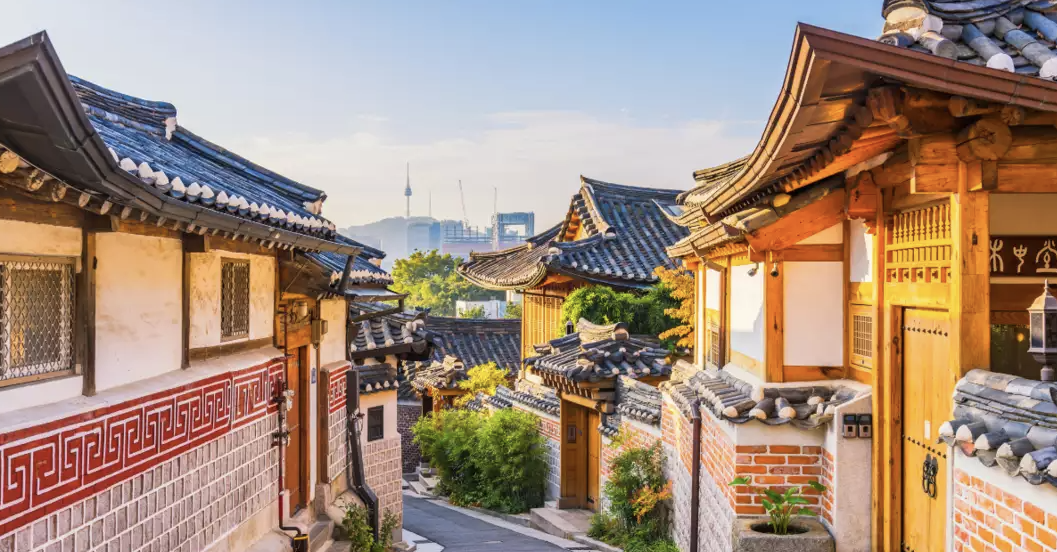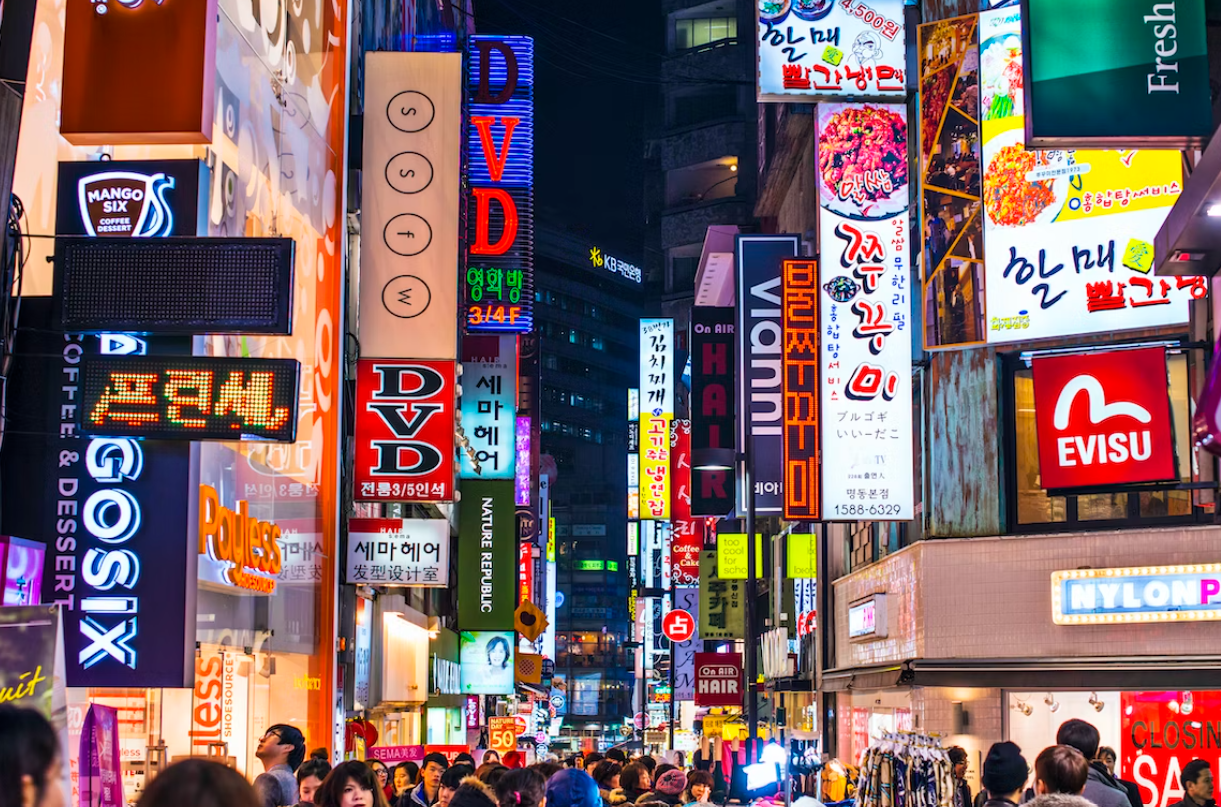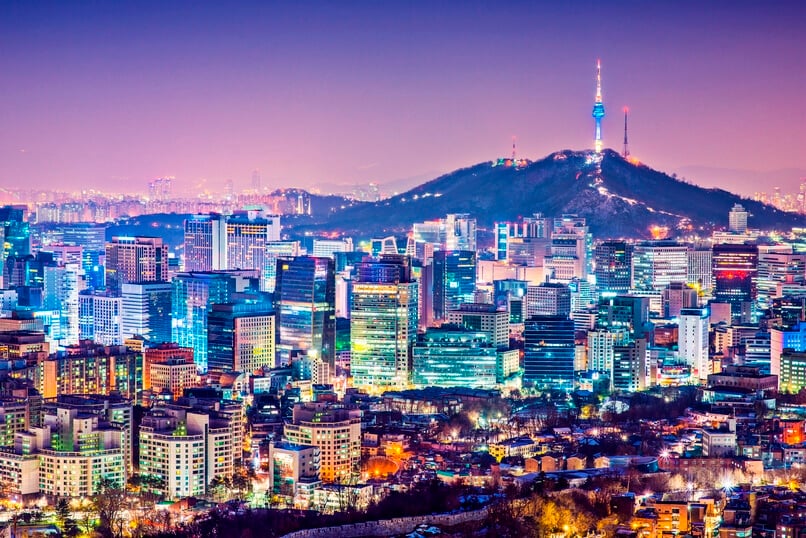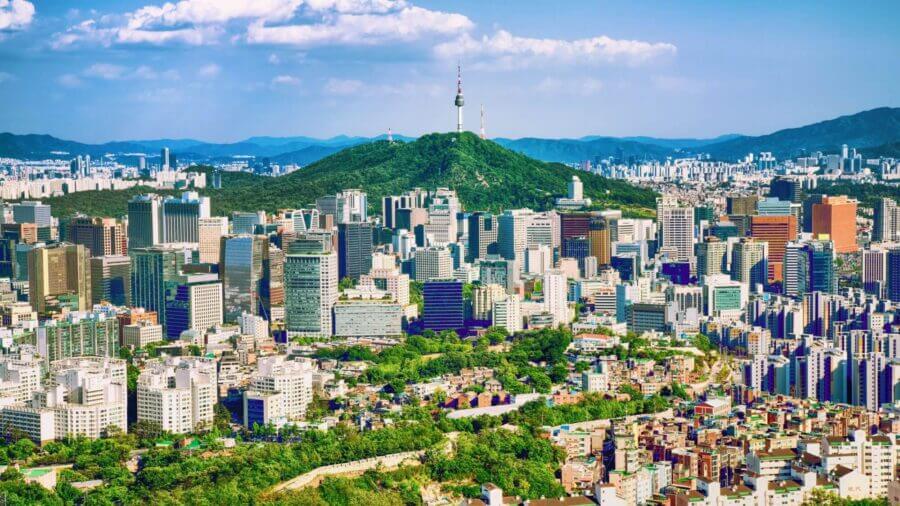Previously considered one of the four “Asian Tiger” economies, South Korea has successfully transitioned into a fully developed nation over the past few decades.
In fact, with a GDP per capita of over US$37,000, South Korea will become a wealthier country than Japan if it continues with its current growth trajectory!
Thirty years ago, brands including Samsung, LG, and Hyundai were practically unheard of internationally. Instead, Japanese brands like Sony and Panasonic were in the limelight.
But today, it’s Samsung which is instead the world’s top-selling appliance brand. And that’s not to even mention the chaebol’s semiconductors and countless other products.
South Korean consumer sales are dominant across multiple sectors that will be crucial during the 21st century, including semiconductors and mobile phones.
The competitive nature of South Korea’s economy is reflected in the World Bank’s annual Ease of Doing Business Index where it’s ranked fifth in the world as of 2025.
If you’re specifically interested in South Korea’s property market, click above to read our full guide about buying real estate in Korea.
Foreign asset ownership is also easier here compared to most other countries in Asia. You can own freehold land and homes in Korea as a foreigner without limits.
It’s one of very few housing markets in Asia where non-citizens don’t face any limits at all. You’ll encounter barely any restrictions when buying property in Korea as a foreigner.
South Korea’s economy certainly isn’t perfect by any measure. Demographic trends are on a downturn, and similar to other industrialized countries in East Asia, Korea will soon undergo a drastic population decline.
And while the Korean Peninsula isn’t prone to earthquakes, tsunamis, or volcanic eruptions like Japan is, they do still need to worry about the “crazy neighbor” up north.
Regardless, Korea has proven itself as one of the world’s most resilient economies. We expect that it’ll continue outperforming the rest of developed Asia in the future.
South Korea: Asia’s Newest Developed Market
In less than half a century, South Korea went from being one of the poorest countries in the world to among the wealthiest.
After the Korean War ended way back in 1953, the nation grew rapidly by implementing policies that encouraged investments and exports.
South Korea impressively avoided the 2008 recession by keeping most of their consumption domestic. They continued to grow while many Western countries faltered.
Today, this mountainous country is widely recognized for its electronic and technology sector, as well as its music and beauty industries.
Not only have they built up a strong and financially stable government but they have gained a large international influence on pop.
Many people throughout the world enjoy South Korean culture. The nation’s relatively newfound soft power has certainly its goal of becoming a popular location for foreign expats and investors.
Best Places to Invest in Korea
South Korea has nine common provinces and several other self-governing provinces, special cities, metropolitan cities, and special self-governing cities that are equal in status to the common provinces.
Five of of South Korea’s most popular cities for businesses and property investors are:
- Seoul (서울시)
- Incheon (인천시)
- Busan (부산시)
- Daegu (대구시)
- Jeju (제주도)
Seoul is the capital of South Korea and is considered a special city with the largest population in the whole country. Out of Korea’s entire population of over 50 million people, more than 20 million of them live in the Seoul metro area.
Not only is Seoul the largest city in South Korea but it is one of the largest urban economies in the world. Seoul ranks as the city with the highest total GDP in the world.
While Seoul is the best-known location in Korea, it isn’t the only option. Busan, Incheon, and Daegu are all considered metropolitan cities with populations between 2 million and 3.5 million.
Meanwhile, Jeju Island has become a more popular destination for foreigners and expats. It’s the largest island in Korea.
Jeju’s popularity is mostly due to its visa-free entry status – even for citizens who otherwise can’t easily enter mainland Korea.
Chinese citizens, for example, are allowed to take a direct flight to Jeju Island without needing a prior visa. They can’t do the same for Seoul or Busan though. Needless to say, this has turned the island into an international hub of sorts.
How to Start a Korean Company
The key to starting a business in South Korea is following the proper steps and learning the culture of the country.
While there are some restrictions, foreigners are able to start a company in South Korea by following the required steps. There are multiple options between the types of businesses you can incorporate.
1. Local Corporation/Foreign Direct Investment Company
2. Branch Office
3. Liaison Office
Most international investors in Korea choose to start either a Local Corporation or Foreign Direct Investment (FDI) company.
Here are the five steps of South Korea’s business incorporation process for this type of company:
– Create a company stamp.
– Choose a bank for initial capital deposit.
– Register the company.
– Open a Korean bank account.
– Establish a registered office in Korea.
Businesses operating in certain industries may be required to take additional steps or apply for permits.
Trading Stocks in South Korea
South Korea’s stock market has grown substantially over the past decade, and is projected to increase its market capitalization even further.
The Korea Exchange (KRX) is headquartered in the metropolitan city of Busan – not Seoul as you might expect.
You’ll find above 2,500 listings on the KSE with a total capitalization above 3 trillion Korean won – or about US$2 billion.
Korean’s stock market is broken down into three main indices: the KOSPI, KOSDAQ, and KRX 100. Whereas the KOSPI tracks all Korean stocks, the KOSDAQ focuses on tech companies, and the KRX 100 only includes the top hundred.
You’ll find a complete range of financial instruments on the Korea Exchange. It’s possible to trade stocks, bonds, exchange-traded funds (ETFs), real estate investment trusts (REITs), mutual funds, options/futures, and more.
The top companies in South Korea by market capitalization include Samsung Electronics, SK Hynix, LG Chem, Naver, and Celltrion.
Foreigners are allowed to freely purchase stocks on the KSE. Non-Korean citizens don’t face any additional restrictions compared to local investors.
As such, foreigners can buy stocks in South Korea, along with all kinds of listed corporate and government bonds.
South Korea’s Currency: The Won
South Korea’s won ranks among the best performing currencies in the region as well, partially because of strong export demand and a healthy trade surplus.
Indeed, looking at the Korean won’s movement since the year 2000, it has maintained greater stability than either the Japanese yen or Chinese yuan.
That’s despite the Korean won’s lack of worldwide usage compared to its larger East Asian peers.
The Korean won is a free-floating currency. As of 2025, one US dollar equals roughly 1,400 Korean won.
Doing Business in South Korea
South Korea is a well-developed economy with many different industries, easily ranking within the world’s top ten importers and exporters.
The nation’s top export commodities include electrical machinery and equipment, computers, vehicles, plastics, oil, medical supplies, iron, steel, and ships. Electrical machinery and equipment together comprise over 30% of the country’s exports.
A few of South Korea’s top imported goods include crude petroleum, iron ore, aluminum, wheat, and corn.
Korea boasts one of the largest automotive industries in the world. It is the fifth-largest automotive sector in terms of automobile unit production. Some automotive companies in South Korea include Hyundai and KIA.
Mining, shipbuilding, and tourism all play big roles in the economy as well. The tourism sector in South Korea supported over 1.8 million jobs in 2025 and expected to contribute over 131 trillion Korean won to the country’s GDP.
Cryptocurrency in South Korea
South Korea is home to several of the largest crypto exchanges in the world. The industry is fully-regulated and legal.
The country has quickly welcomed and adapted to the world of cryptocurrency. The government of South Korea has been welcoming of cryptocurrency and blockchain tech.
Consequently, Koreans and foreign residents are able to purchase and use cryptocurrency legally in South Korea.
Cryptocurrency is a fully regulated currency in South Korea. This regulation includes a 20% income tax.
Banks have also adapted to crypto in Korea, and lots of large financial institutions offer services in bitcoin and ether. This certainly makes life easier as a crypto investor – whether local or foreign.
Buying Real Estate in South Korea
Foreigners can legally purchase property in South Korea so long as they follow government regulations.
Usually, foreign property owners don’t face any restrictions in South Korea. You can can buy the same types of real estate that locals can, including freehold land and houses.
Foreign investors must comply with The Foreigner’s Land Acquisition Act, The Registration of Real Estate Act, and The Foreign Exchange Transactions Act.
While you can legally purchase property in South Korea though, you may not be able to afford it, depending on where you are looking to invest.
Seoul is the most expensive market for property in South Korea and the third priciest housing market per meter in Asia, only rivaled by Hong Kong and Singapore.
Buying an apartment in Seoul is generally more expensive than in London or New York City. You should fully expect to pay the equivlant of few million US dollars for any landed property in a desirable Seoul neighborhood.
Centrally-located real estate in Seoul costs around US$20,000 per square meter. Therefore, you won’t really find any cheap properties here from a global perspective.
Outside of Seoul, you may want to consider investing in property in another city like Busan, Incheon, or Daegu. Or you might want to consider investing in real estate on Jeju island.
When you purchase a property in South Korea, you’ll have to pay fees and taxes. For starters, upon transferring real estate, buyers must a 0.2% stamp duty. This is among the lowest stamp duty taxes in Asia.
You’ll also have to pay a 10% VAT tax, 5% toward housing bonds, 3% for registration tax, 2% for acquisition tax, and some other possible taxes and legal fees.
The rental situation in South Korea is unique, to say the least. You have two options for how rent can be paid: Wolse and Jeonse.
Wolse is very similar to a western concept of lease, where you pay rent as a specific amount every month.
Jeonse has the tenant pay money upfront that is equal to the price of the property. They don’t pay monthly rent, and in turn, get their full deposit back when the contract ends.
Private Equity in South Korea
Since the Asian Financial crisis in 1997 and 1998, South Korea has expanded its Venture Capital by using both privately funded and publicly funded approaches, with varying laws for each approach.
VC investments in Korea are regulated by the Support for the Establishment of Small and Medium Enterprises Act, the Specialised Credit Finance Business Act, and the Act on Special Measures for the Promotion of Venture Businesses.
Today, most SMEs rely on bank loans versus venture capital investments for start-up financing as venture capital investments have shifted over the years from early stage SMEs to more established companies.
Some of the most prominent venture capitalist firms in South Korea are:
- POSCO Venture Capital
- Korea Investment Partners
- SoftBank Ventures Asia
- Altos Ventures
- STONEBRIDGE Ventures
Should You Invest in South Korea?
South Korea has built up a strong economy and name for itself over the years. The country has become a leader in many industries. No doubt, they’ve earned the attention and respect it has garnered in recent years.
While not a frontier market like Vietnam or Cambodia, South Korea still has plenty of options for investing. You can find numerous opportunities to invest in stocks, or property, and there are favorable conditions for crypto investors as well.
The South Korean economy is strong, stable, and set to continue its current growth trajectory.
Regardless, if you are looking to get ahead of the curve, you may find better opportunities elsewhere. Or at least outside of Seoul.
In the end, South Korea is welcome to foreigners both from an investment standpoint as well as for lifestyle purposes. It is a great location for expats while also offering opportunities for business and investment.
To conclude: South Korea is a great place to do business, buy stocks, own real estate, or even call home!
Investing in South Korea: FAQs
How Can I Trade Stocks in Korea?
It's relatively uncommon for brokerage firms to support trading on the Korea Exchange - even large ones like Fidelity don't offer access to stocks in Korea.
However, it's still possible to trade in South Korea through a select few brokerage firms. Interactive Brokers is one that supports trading on the Korea Exchange.
Can Foreigners Buy Property in South Korea?
Yes, foreigners are able to own houses, condos, and other types of property in South Korea on a freehold basis.
In fact, South Korea is one of the easiest countries in Asia to buy real estate as a foreigner. It's even possible to own freehold land as a non-Korean citizen here, which makes it fairly unique in the region.
Is Crypto Legal in South Korea?
Cryptocurrency is fully-legal and regulated in South Korea. This has helped turn the nation into one of the world's top crypto hubs.
With that said, Crypto isn't considered as official legal tender or a financial asset in South Korea. It's completely legal to exchange bitcoin, ether, and other any other form of cryptocurrency though.
Can Foreigners Own Land in Korea?
Yes, it's possible to buy land in Korea regardless of nationality. Foreigners can own houses, villas, and other types of landed property in Korea.
The only main restriction is that foreigners can't easily own agricultural, historical, and some other types of protected land which are reserved for Korean citizens only.
Is South Korea a Developed Country?
South Korea is most certainly a developed nation. It's one of the wealthiest countries in the world, in fact.
It's true that some outdated indicies still list South Korea as an emerging market. However, by any reasonable measure including human development and GDP per capita, it progressed into an advanced economy well-over a decade ago.

South Korea
Capital
Seoul
Currency
Korean Won
Population (2025)
51,667,029
GDP (2025)
US$1.95 trillion
GDP Per Capita
US$37,672
GDP Growth (5 Year Avg.)
2.72%
Skip the Next Western Recession
Learn the best places to invest – and where to avoid – by downloading our free Investment Cheat Sheet.
READ MORE ABOUT SOUTH KOREA
READY TO INVEST IN THE WORLD’S FASTEST GROWING COUNTRIES?
Join 50,000+ monthly readers. Discover property, stocks, and other investments that will drive global growth in the 21st century.

